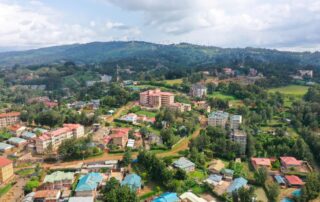Kenya's land ownership framework is governed by comprehensive legislation designed to provide security of tenure while protecting both individual rights and community interests. Understanding these laws is crucial for anyone involved in property transactions, whether buying, selling, or developing land. This guide provides detailed insights into Kenya's land ownership system and its practical implications.
Constitutional Framework for Land Rights
The 2010 Constitution of Kenya established fundamental principles governing land ownership and use. Article 60 outlines key principles including equitable access to land, security of land rights, sustainable and productive management of land resources, transparent and cost-effective administration of land, and sound conservation and protection of ecologically sensitive areas.
The Constitution recognizes three categories of land: public land, community land, and private land. This classification system provides the foundation for all land ownership and use regulations in Kenya, with specific rights and obligations attached to each category.
Types of Land Ownership
Freehold Ownership
Freehold represents the highest form of land ownership in Kenya, providing absolute ownership rights:
- Perpetual ownership: Land is owned indefinitely without time limitations
- Full control: Owner has complete rights to use, develop, lease, or sell
- Inheritance rights: Property can be passed to heirs without restrictions
- Mortgage security: Can be used as security for loans and mortgages
- Title document: Evidenced by a Certificate of Title or Title Deed
Leasehold Ownership
Leasehold provides ownership rights for a specified period:
- Time-limited: Ownership for periods typically ranging from 50-999 years
- Government grants: Usually issued by national or county governments
- Renewal options: Many leases can be renewed upon expiration
- Conditions attached: Subject to specific terms and development requirements
- Ground rent: Annual payments may be required to the grantor
Community Land
Land owned and managed by specific communities:
- Collective ownership: Held by specific communities or groups
- Customary law: Often governed by traditional land management systems
- Registration process: Requires formal registration under the Community Land Act
- Management committees: Community institutions oversee land use and allocation
- Development potential: Can be converted to individual ownership through subdivision
Key Land Laws and Regulations
Land Act, 2012
The primary legislation governing land ownership and administration:
- Comprehensive framework: Covers all aspects of land ownership and use
- Registration procedures: Establishes processes for land registration and transfer
- Rights and obligations: Defines owner rights and responsibilities
- Dispute resolution: Provides mechanisms for resolving land conflicts
- Administration structure: Establishes institutions for land management
Land Registration Act, 2012
Governs the registration of interests in land:
- Registration system: Establishes procedures for registering land rights
- Title documents: Specifies formats and requirements for title documents
- Search procedures: Enables public access to land records
- Electronic systems: Provides for computerized land records
- Fees and charges: Establishes costs for registration services
Community Land Act, 2016
Specific legislation for community-owned land:
- Recognition framework: Formally recognizes community land rights
- Registration procedures: Establishes processes for registering community land
- Management structures: Requires formation of community land management committees
- Use planning: Mandates community land use plans
- Conversion options: Allows conversion to individual or group ownership
Physical Planning Act, 2019
Governs land use planning and development control:
- Development control: Requires approvals for land development
- Planning standards: Establishes minimum standards for development
- Zoning regulations: Controls land use in different areas
- Environmental protection: Integrates environmental considerations
- Public participation: Requires community involvement in planning
Land Registration Process
Due Diligence Requirements
Essential steps before purchasing land:
- Title search: Verify ownership and check for encumbrances
- Land search: Confirm property boundaries and size
- Rates clearance: Ensure all land rates and taxes are paid
- Planning approval: Verify development permissions and restrictions
- Survey verification: Confirm property boundaries through professional survey
Property Transfer Process
Steps involved in transferring land ownership:
- Sale agreement: Execution of binding sale agreement
- Consent applications: Obtain necessary government approvals
- Transfer documents: Preparation of transfer instruments
- Stamp duty payment: Payment of government taxes
- Registration completion: Final registration of new ownership
Required Documentation
Documents needed for land transactions:
- Title deed/Certificate: Proof of current ownership
- Sale agreement: Contract between buyer and seller
- Transfer forms: Official government transfer documents
- Identity documents: National IDs or passports of parties
- Tax compliance: KRA compliance certificates
- Survey plans: Accurate property boundary maps
Consent Requirements
Government Consent
Situations requiring government approval:
- Agricultural land: Transfer of agricultural land requires consent
- Foreign ownership: Non-citizens need approval for land acquisition
- Large transactions: High-value transactions may require approval
- Special zones: Land in controlled areas needs special consent
- Processing time: Consent applications typically take 60-90 days
County Government Approvals
Local government requirements:
- Land use changes: Approval for changing land use categories
- Development permits: Building and development approvals
- Subdivision consent: Permission for dividing land parcels
- Environmental clearance: Environmental impact assessments
- Local regulations: Compliance with county-specific requirements
Restrictions on Land Ownership
Foreign Ownership Limitations
Restrictions on non-citizen land ownership:
- Leasehold only: Non-citizens cannot own freehold agricultural land
- Urban property: Can own urban residential and commercial property
- Investment limits: Restrictions on size and value of holdings
- Approval requirements: Government consent needed for acquisitions
- Succession rights: Limited inheritance rights for foreign-owned property
Land Size Limitations
Restrictions on the size of land holdings:
- Agricultural limits: Maximum sizes for different farming areas
- Urban holdings: Regulations on urban property accumulation
- Anti-monopoly measures: Prevention of excessive land concentration
- Public interest: Limitations based on public policy objectives
Environmental Restrictions
Environmental protection limitations:
- Protected areas: Restrictions near forests, water bodies, and wildlife areas
- Wetland protection: Prohibition on development in wetland areas
- Slope limitations: Restrictions on steep terrain development
- Buffer zones: Required distances from environmentally sensitive areas
Women's Land Rights
Constitutional Protections
Legal framework protecting women's land rights:
- Equal rights: Constitutional guarantee of equal land rights
- Non-discrimination: Protection against gender-based discrimination
- Inheritance rights: Equal inheritance rights for daughters and wives
- Spousal consent: Required consent for disposal of matrimonial property
- Legal remedies: Court protection for violated land rights
Matrimonial Property
Laws governing marital property rights:
- Joint ownership: Recognition of joint contribution to property acquisition
- Consent requirements: Spousal consent needed for property transactions
- Division principles: Fair division upon divorce or separation
- Protection measures: Legal safeguards against property grabbing
Succession and Inheritance
Law of Succession
Legal framework for property inheritance:
- Will-based succession: Property distributed according to valid wills
- Intestate succession: Legal rules for inheritance without wills
- Family provision: Protection for surviving family members
- Administration process: Court procedures for estate administration
- Time limitations: Deadlines for succession applications
Succession Certificate
Documentation for inherited property:
- Grant of representation: Court authority to administer estate
- Transfer procedures: Steps for transferring inherited property
- Tax obligations: Succession duty and tax requirements
- Beneficiary rights: Rights of heirs to inherited property
Land Dispute Resolution
National Land Commission
Constitutional body for land administration:
- Investigation powers: Authority to investigate land disputes
- Mediation services: Alternative dispute resolution mechanisms
- Compensation determination: Assessment of compensation for land acquisition
- Policy recommendations: Advice on land policy and legislation
- Public complaints: Forum for public land grievances
Environment and Land Court
Specialized court for land disputes:
- Jurisdiction: Authority over land and environmental disputes
- Fast-track procedures: Expedited resolution of land cases
- Specialized judges: Judges with land law expertise
- Alternative dispute resolution: Mediation and arbitration options
- Enforcement powers: Authority to enforce land law decisions
Community Land Disputes
Resolution of community land conflicts:
- Community mechanisms: Traditional dispute resolution systems
- County mediation: County government mediation services
- Boundary disputes: Procedures for resolving boundary conflicts
- Grazing rights: Conflict resolution for grazing and water rights
Digital Land Records
Computerized Land Registration
Technology modernizing land administration:
- Digital records: Electronic storage of land records
- Online searches: Internet-based title searches
- Reduced fraud: Enhanced security through digital systems
- Faster processing: Automated processing of transactions
- Geographic mapping: GPS-based boundary mapping
Benefits of Digital Systems
Advantages of computerized land records:
- Transparency: Public access to land information
- Efficiency: Faster transaction processing
- Security: Reduced risk of document loss or fraud
- Cost reduction: Lower transaction costs
- Better planning: Improved data for land use planning
Investment Protection Strategies
Due Diligence Best Practices
Protecting land investments through proper investigation:
- Professional searches: Engage qualified lawyers for searches
- Physical inspection: Visit and inspect property boundaries
- Neighbor consultation: Discuss boundaries with adjacent owners
- Multiple verifications: Cross-check information from various sources
- Professional survey: Obtain current survey from licensed surveyor
Legal Safeguards
Legal measures for investment protection:
- Proper documentation: Ensure all documents are authentic and complete
- Legal representation: Engage qualified legal counsel
- Insurance coverage: Obtain title insurance where available
- Compliance verification: Ensure all regulatory requirements are met
- Regular monitoring: Keep track of changes in land laws
Recent Developments and Reforms
Digital Transformation
Ongoing modernization of land administration:
- Online platforms: Web-based land registry services
- Mobile applications: Smartphone apps for land searches
- Blockchain pilot: Experimental blockchain land registries
- GPS mapping: Satellite-based boundary mapping
- Data integration: Linking land records with other government databases
Legal Reforms
Recent changes in land legislation:
- Process simplification: Streamlined land transaction procedures
- Fee reductions: Lower costs for land registration services
- Time limits: Faster processing timelines for land transactions
- Transparency measures: Enhanced public access to land information
- Dispute resolution: Improved mechanisms for resolving land conflicts
Practical Recommendations
For Property Buyers
Essential steps for safe land purchases:
- Professional assistance: Always engage qualified lawyers and surveyors
- Comprehensive searches: Conduct thorough title and land searches
- Physical verification: Visit and inspect the property personally
- Documentation review: Carefully examine all legal documents
- Timeline management: Allow adequate time for due diligence
For Property Developers
Considerations for development projects:
- Planning compliance: Ensure all development approvals are obtained
- Environmental clearance: Secure required environmental approvals
- Community engagement: Involve local communities in planning process
- Infrastructure provision: Plan for adequate infrastructure development
- Legal compliance: Maintain compliance with all applicable laws
Future Outlook
Technology Integration
Expected technological developments:
- Full digitization: Complete electronic land registration system
- Artificial intelligence: AI-powered fraud detection and processing
- Mobile accessibility: Comprehensive mobile land services
- Data analytics: Better land use planning through data analysis
- International standards: Alignment with global best practices
Legal Evolution
Anticipated changes in land law:
- Simplified procedures: Further streamlining of land transactions
- Enhanced protection: Stronger safeguards for land rights
- Environmental integration: Better integration of environmental laws
- Regional harmonization: Coordination with regional land policies
- Investment facilitation: Policies supporting land-based investment
Conclusion
Understanding Kenya's land ownership laws is essential for anyone involved in property transactions or land-based investments. The legal framework provides strong protections for land rights while establishing clear procedures for ownership transfer and dispute resolution.
Success in land transactions requires careful attention to legal requirements, thorough due diligence, and professional assistance from qualified lawyers and surveyors. The ongoing digitization and reform of land administration systems promises improved efficiency and transparency in land transactions.
Stay informed about changes in land laws and regulations, maintain proper documentation for all land dealings, and always seek professional legal advice for significant land transactions. Proper understanding and compliance with land laws will protect your investment and contribute to the overall development of Kenya's property market.




